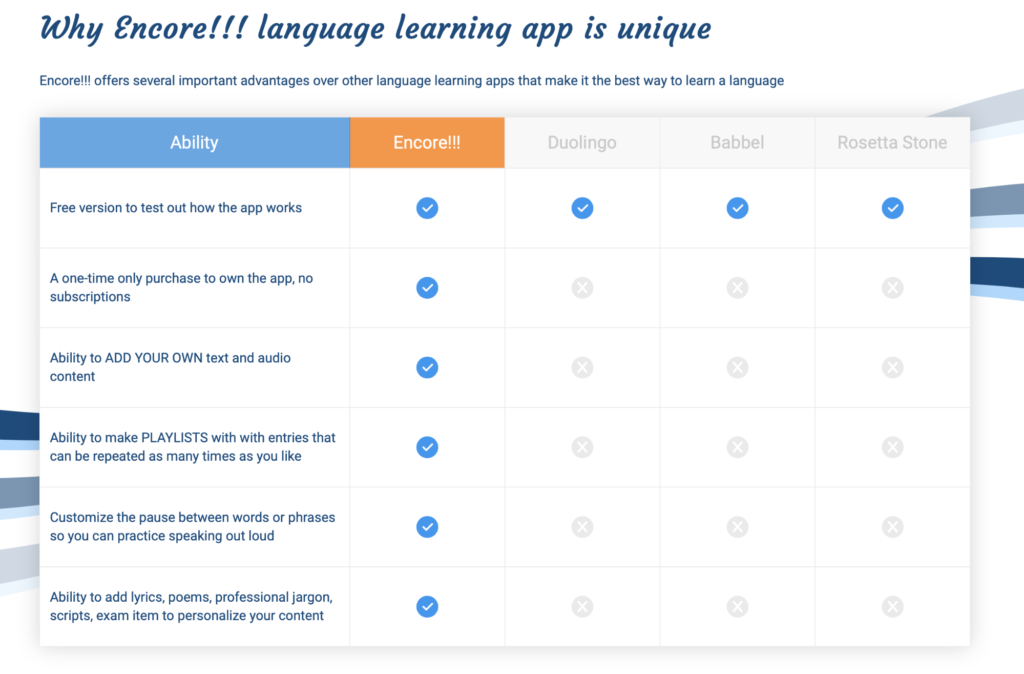How Important Is a Proper Accent For Learning And Using a New Language?
One of the things that foreign language students struggle with the most is learning the proper language accent for the language they are studying. A great example of this is from the 1985 movie National Lampoon’s European Vacation. The scene where Clark Griswold (Chevy Chase) tries to order in French (using a translation device) at a bistro in Paris, while the waiter mocks him, is a great example of the importance of pronunciation in learning a new language.
In addition, a good accent helps you connect to the culture of the country of the language you are studying. But, is a perfect accent necessary to begin speaking conversationally? Absolutely not.
The goal and purpose of learning a new language is clear communication with other people. In most countries we’ve visited, native speakers are actually forgiving of accent errors and will go the extra mile to help you better learn their language. So long as you can effectively communicate your needs, your accent will be secondary. In this article, we will explore how to develop an accent. We will provide best practices and practical solutions to help you improve your pronunciation of the language you are learning.
What is an accent?
Everybody has an accent. Whether you’re from America, Denmark, or Peru – you have an accent. So why do people have accents? According to Damir Cavar and Anthea Fraser Gupta:
“Your accent results from how, where, and when you learned the language you are speaking and it gives impressions about you to other people. People do not have a single fixed accent which is determined by their experiences. We can control the way we speak, and do, both consciously and unconsciously. Most people vary their accent depending on who they are speaking with. We change our accents, often without noticing, as we have new life experiences.”
However, a language accent can have many different types of variations, called dialects, which indicate where in your country of origin you are from.
Think of America, most people born here speak English. However, there are many variations of American English that can give listeners an indication where you are from: There is Southern, Mid-Atlantic, Midwest, Californian, Chicagoian, Minnesotan, and many more examples of regional dialects within just this country.
What About a Text to Voice Generator?
Text to speech software and text to speech engines are a valuable tool to facilitate conversation if you do not speak the language at all. Programs like Google text to speech, Apple text to speech, and Amazon text to speech are good for getting simple answers to simple questions while traveling. Such as, “How much does that cost?” Or, “How do I find this street?” And, (the ever popular,) “Where is the bathroom?”
Many of us can remember high school French class where one of the key phrases we first learned was, “Où est la bibliothèque?” None of us remember why it was so important to know how to find the library, but in classroom language learning for Americans, there is usually a heavy emphasis on learning the correct pronunciation and enunciation of key phrases that could help you navigate through the basic functions of visiting another country.
Répétez, s’il vous plaît!
Perhaps you can also remember your French teacher saying this phrase?
Repetition is the key to learning a language and improving upon an accent. And, apps using text to voice give you plenty of opportunities to “répétez ceci encore!”
One of the things that is important in a text to voice application is that it teaches you both the formal and informal way of speaking important phrases.
Take for example introducing yourself in French. While saying “Je m’appelle Bill.” (My name is Bill,) is the technically correct way to introduce yourself in French – it is used in very formal settings. Whereas, when you meet someone in a bar or café the more familiar way to introduce yourself is “Je suis Bill.” (I am Bill.)
Encore!!! language learning app will teach you both precept proper and personal precept versions of language to ensure you fit into whatever environment you are speaking in.
This differentiates the app from other apps like Google text to speech, Apple text to speech, and Amazon text to speech – which will only provide you with the precept proper pronunciations of key words and phrases when you are learning language.

Keep in mind, text to voice apps will not teach you emotional inflection when speaking. But, they are excellent tools to help you hack words and phrases, or in backchaining words that have phonetic sounds that do not appear in your language of origin.
How to Learn an Accent
Learning how to develop an accent takes time and repetition. There are many ways to accomplish learning an authentic language accent.
The first, and the most obvious way, to perfect your accent is with language immersion and/or having frequent conversations with a native speaker. The second is to use an app like Encore!! to practice your accent in a very methodical way.
Beyond that, there are many ways you can practice your accent and improve upon it.
How to improve pronunciation:
- Practice makes perfect! Of course a teacher of any subject, anywhere, will tell you that the key to mastering a new skill is to practice. Use that text to voice app whenever you have 5 minutes, have your friend who speaks the language fluently chat with you and give you notes on how to improve your accent, listen to native speakers whenever and wherever you can. And, talk. Speak the language as much as possible!
- Listen to recordings or to the speech of native speakers. The more that you hear the accent you are trying to master, the more likely you’ll start to pick it up naturally. This is where voice to text generators can come in very handy, in apps like Encore!!! you can make playlists of music being sung and text being spoken in the language you are learning. You can play them on repeat to help you understand the keys to pronunciation of the language you’re learning.
- Work backwards. If you come to a word that includes sounds not found in your own language, start at the end of the word and reconstruct it syllable by syllable. This is called “backchaining” and is a common teaching technique when teaching category 3 and category 4 languages to native English speakers.
- Sing! The most fun way to learn an accent in language is to sing it out. Find music in the language you are learning that you enjoy, learn the lyrics, and sing along with the music. (In 2019, many American Spanish teachers used this method of learning an accent, and had their students sing along with Luis Fonsi’s Despacito.)

So how long does it take to pick up an accent? According to linguistic specialists, with daily practice, it will take you about 6 months to have a reasonably authentic accent. And, as the objective of learning an accent is to make your communication clearer with native speakers, it doesn’t have to be perfect. But, having a realistic accent that shows you are fluent in the language will be important.
What Is The Difference Between Enunciation And Pronunciation?
While both pronunciation and enunciation are both important to learning an authentic accent, they are different things. Pronunciation is the act of articulating a word or phrase. Enunciation is how crisply and clearly you speak words.
Why is pronunciation so important?
Pronunciation and the clear understanding of the language you are learning go hand-in-hand. When you learn how to pronounce words correctly, with the correct intonation, your understanding of language will be greatly increased.
The best way to improve pronunciation is to practice… a lot!
Why is enunciation so important?
Enunciation is important because it helps facilitate understanding of what you are saying. This is particularly true in the recitation of classic plays, religious texts, and business communications.
Really, though, in this global community, there should be a huge focus on clear communication. As long as you’re communicating in a way that your conversation partner understands, know that pronunciation, enunciation, and intonation are skills you can continue to improve upon as you refine your language skills.
Conclusion
There are a lot of reasons why learning an authentic accent is important when learning a new language. However, the most important aspect of learning a language not your own is to communicate with other people. Accent is something that you can develop over time, it should not be a barrier to using your new language skills.
While in government foreign services there is a huge emphasis on perfecting accents, just learning to communicate is the core of language learning. And, we shouldn’t judge the Chevy Chases of the world who are just trying to order a steak and fries.
How to Use Contents in this folder
